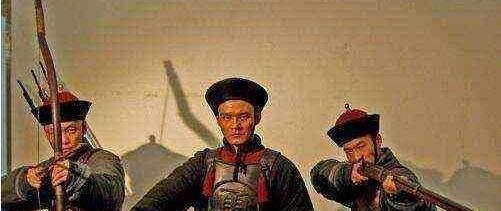When watching many Qing Dynasty film and television dramas, many people should have seen the set of military uniforms worn by the actors of the dragon suit, and most of these military uniforms will write some words on them. These words generally symbolize the identity of the owner of the clothes.
Most of the costumes worn by soldiers in the Qing Dynasty will have the words "brave", "soldier", "soldier", "Ding", "卒" and so on, and different words represent different powers.

The first is "Yong", this kind of clothing was born in the Yongzheng Qianlong period, wearing "Yong" character uniforms, most of the soldiers in the army can only be regarded as temporary personnel, the regular army of the Qing Dynasty in addition to the Eight Banner Soldiers, there are green battalion soldiers, if the number of soldiers is insufficient, the Qing government will also choose to recruit some fresh blood from other places, this is the "Yong" character military uniform.
Soldiers dressed in such uniforms are generally temporary personnel, and the war will be temporarily recruited, and once the war has passed, such soldiers will be sent home.
Of course, the "Yong" army basically became the main reliance of the late Qing Dynasty, and when the Taiping Heavenly Kingdom rose, the Eight Banner Soldiers and the Green Battalion soldiers were defeated one after another, or the emergence of the Xiang Army was fierce, and it was forced to continue the life of the late Qing Dynasty for half a century.
Dressed in the uniform of the word "soldier", it is a typical regular army, which has also been described above, and the regular army mainly includes two kinds, one is the Eight Banner Soldiers, and the other is the Green Battalion Soldier, of which the Eight Banner Soldiers are completely composed of the Eight Banners and belong to the Manchu army, while the Green Battalion Soldiers are han soldiers who fill in to make up for the lack of Manchu numbers.
Of course, although the Eight Banner Soldiers and the Green Battalion soldiers are both regular troops of the Qing government, the Eight Banner Soldiers are dominant, and some trivial matters in peacetime are entrusted to the Green Battalion soldiers, while the Eight Banner Soldiers are responsible for defending the capital.
Soldiers dressed in military uniforms with the character "卒" should be the same as ordinary soldiers in the eyes of many people, and there is nothing special about them, but in the Qing Dynasty, pawns mainly refer to soldiers stationed in prefectures and counties, and some of these soldiers are also responsible for the guards of prisons, that is, jailers, but not exactly.
The status of "soldiers" is relatively high, generally they are non-commissioned officers in the army, which is very different from ordinary pawns.
The so-called "Ding" is even more irregular, wearing this kind of clothing, but most of them are some local armed or private armed forces, the imperial court has no money for them, but these soldiers are directly provided by the local government.
Of course, most of the soldiers who appear are also soldiers with the words "soldier" and "brave", both of which are relatively frequent soldiers.
Before the late Qing Dynasty, the status of soldiers was obviously higher than that of yong, after all, soldiers were regular troops, and bravery could only be counted as a temporary army, or militia, and it was not natural that the regular army was stronger than the militia.
However, this situation was completely rewritten after the Tianping Heavenly Kingdom, as mentioned above, during the Taiping Heavenly Kingdom period, the regular army of bingzi, the Eight Banner Soldiers, had long been rotten, and the Green Battalion's combat strength was low, far from being able to resist the powerful Taiping Heavenly Kingdom, at this time Zeng Guofan established the Xiang Army, that is, the militia, and for a long time after that, the militia became the basis for maintaining rule in the late Qing Dynasty.
Of course, after the Western Affairs Movement, this simple division naturally could not meet the needs of the late Qing government, they trained a new type of army, and naturally there were no small changes in clothing and names compared with before.
The new type of army, with modern weapons and modern clothing, the simple soldiers and pawns of the past have slowly disappeared.